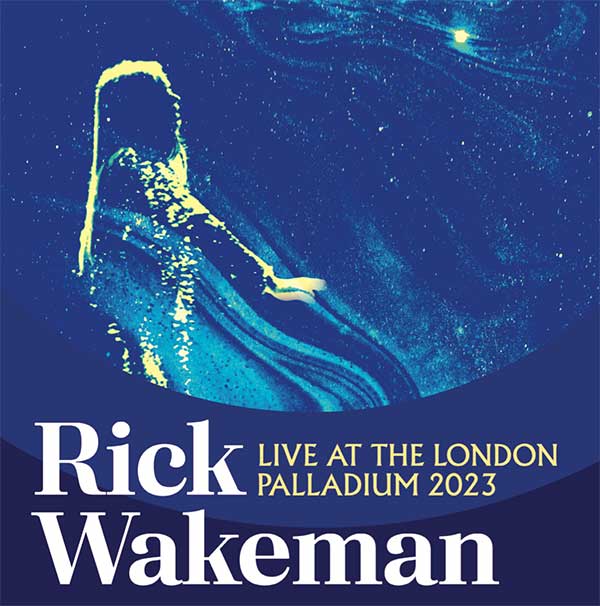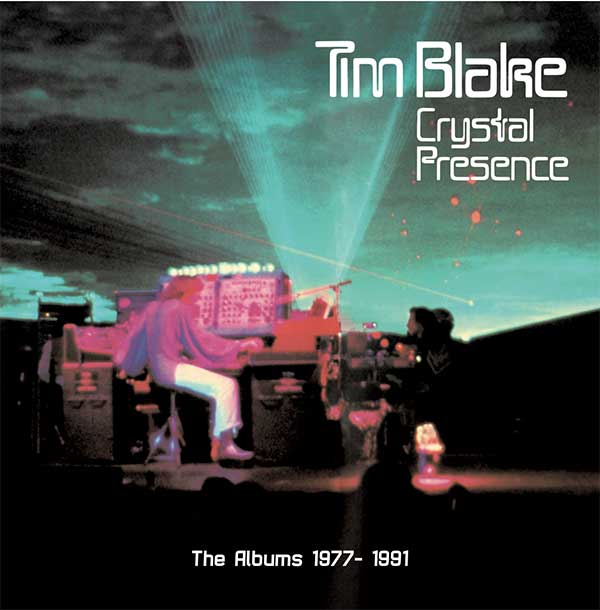

Live at the London Palladium 2023, Rick Wakeman (4CD, Cherry Red)
Crystal Presence, Tim Blake (3CD, Cherry Red)
All round nice bloke and grumpy old man Rick Wakeman chose to revisit and perform some of his earliest classic albums last year, with The English Rock Ensemble and The English Chamber Choir in tow. He even got some sparkly capes out of his dressing-up box for the occasion. Wakeman’s liner notes describe long rehearsals, how he was ‘keen to adapt and amend his past works’ and how much time was spent ‘stripping them down so they could showcase the English Rock Ensemble without having to compete with an orchestra behind them.’
Unfortunately, I have never been a fan of said Rock Ensemble, and although Adam Wakeman is a fine keyboard player like his Dad, and despite some fans and critics raving about Lee Pomeroy’s bass playing, this album does little to change my opinion. It’s hard to see the arrangements as an improvement to be honest, especially because they mostly seem to feature appalling vocals, but also because of Wakeman’s use of some very dodgy 70s keyboard sounds.
The best is first. The Six Wives of Henry VII, Wakeman’s first solo album, remains a masterful piece of music where pseudo-classical and rock combine into romantic dreamscapes, mournful elegies and angry lovelorn despair. This version has a few wonderful moments, but even ‘Catherine Howard’, which makes use of the hymn ‘The Day Though Gavest Lord is Ended’, has lost its melancholic edge, and elsewhere Wakeman indulges in some really unnecessarily bombastic twiddles.
The Myths and Legends of King Arthur and the Knights of the Round Table is up next. The original album always sounded rough whenever the band kick in, not to mention the strained vocals, but here it’s even worse. It seems to have lost the sense of pomp and chivalry the original had, and also the humorous elements of ‘Merlin the Magician’, here relegated to an encore, whilst a couple of new tracks have appeared. And although Hayley Saunders is clearly a much better singer than Gary Pickford Hopkins was on the original, the vocals still feel awkward and at odds with the music.
But there is worse to come. The third CD offers up ‘Classic Yes’ on the sacrificial altar of pomp & circumstance, but takes its time to dismember and slowly kill each of the selected tracks (one of which is not even a Yes track but from the misjudged Anderson, Wakeman, Bruford, Howe album). ‘Roundabout’ is quickly despatched (though not quickly enough) as a quick boogie with synthesizer noodles layered over it, before ‘The Yes Suite’ commences, with the AWBH song ‘The Meeting’, which is swiftly followed by ‘Wondrous Stories’, a nice enough song, but hardly ‘Classic Yes’! ‘Southside [sic] of the Sky’ comes next to close the Suite, before an almost lovely ‘And You and I’ and another rock-out, this time of ‘Starship Trooper’ where the version of the end part, ‘Wurm’, simply highlights how inventive and masterly guitarist Steve Howe was and is. But, ‘almost lovely?’ I hear you say. I’m sorry, but throughout these versions singer Saunders is ghastly, having neither the vocal reach or inflection required for these songs.
It was with a heavy heart I turned to CD4 and Journey to the Centre of the Earth, an album I have never liked, and whose 21 tracks here do nothing to persuade me I was wrong. Bloated, undeveloped, themes come and go, fragments of songs and tunes suddenly start and stop, and the choir or mellotron (it’s difficult to know which, but probably the former) do their wordless choral stuff far too often. At this point I was tempted to call the review something like ‘Tunes We Have Loved’, but that would do a disservice not only to Wakeman’s past achievements but to Tim Blake, who also has a box set of music released.
Blake is a different kind of musician. He is a cosmic voyager, initially heard on Gong’s Radio Gnome Invisible trilogy, and later as part of Hawkwind and some of its splinter groups. Back in the 70s, like Wakeman, he played within banks of keyboards arranged around him and also had a penchant for glittery fabric and cloaks. There, perhaps, the similarities end.
Blake can be over the top, but he is rooted in more electronic music (think Tangerine Dream; think sequencers, bouncing bass, ticking sounds and high-toned squiggles). This isn’t progrock, this is abstract psychedelia, proto-trance music for long-haired rebels and outcasts back in the day.
Crystal Machine, the first album here, is for me, the masterpiece. Crystal Machine, the band, were actually Blake and a pioneering lazer and lightshow artist, Patrice Warrener, but in this release of course we only have the music and a few photos in the booklet, to consider. The music is outstanding, particularly the 15 minute ‘Synthese Intemporel’, although the brief, dark and doomy album closer ‘Crystal Presence’ is a bit of a downer.
Then it’s on to Blake’s New Jerusalem, which unfortunately also sees Blake sing. Acoustic guitars and folky vocals are overlaid against the synthesizers (Jean-Phillipe Rykiell also plays minimoog on a couple of tracks here) of ‘Song for a New Age’, sounding exactly like you are imagining. ‘Lighthouse’ is better, with more bass tones and swirling layers, but Blake insists on singing about how we should build a crystal lighthouse to tell everyone where they are, and also has some low-key treated voices buried in the mix.
There’s more of this kind of thing on ‘Generator (Laser Beam)’ but thankfully ‘Passage Sur La Cite (Des Revelations)’ sees a return to musical form (and no vocals) before the epic ‘New Jerusalem’ arrives. Mostly instrumental, it does unfortunately descend into declamatory silliness and echoey vocals towards the end, but soon recovers and relentlessly heads toward a calming big swell of sound to end the track (and the original album; there’s a pintless two minute ‘bonus track’ appended here). It’s strange how the addition of vocals seem to cause Blake’s music to become less complex and interesting as it tries to create space for the vocals: a very old-fashioned idea that prioritises vocals and ‘lyrical content’ over music, something that in his own way Jon Anderson in Yes was challenging with his poetic lyrics that defied traditional understanding.
The third CD and album here, Magick, is from 1991, and is basically a home recording, which the press release suggests ‘confirms [Blake’s] status as a true pioneer of ambient electronica’. I’m not so sure, to be honest. It feels more like a man reliving his past, revisiting the glory days of Gong and Hawkwind to produce a somewhat simplistic and twee, insular and backward-looking, album. Perhaps asking some other people – even pothead pixies, space travellers and acid casualties – might have helped Blake have a more self-critical approach, as would listening to what was happening elsewhere in music. As it stands it’s a somewhat lowkey and desultory album to close the box set, evidence of a man out of time, adrift in innocent idealism and electronic nostalgia.
But at least it’s better than Wakeman’s offering and might help draw more attention to his beguiling first two albums.
Rupert Loydell

I’ve seen Tim Blake perform with Hawkwind a couple of times, including on their 50th tour. I also saw them way back in 1979 – the tour captured on Live 79 (https://www.youtube.com/watch?v=nI5e61-y3fI) where the Hawks do a wonderful rendition of Blake’s Lighthouse. The ‘official bootleg’, for want of a better phrase, Complete ’79: Collector Series Volume 1 also includes Blake’s New Jerusalem. And there’s a nice interview with Blake here: https://www.psychedelicbabymag.com/2020/10/tim-blake-interview.html. A fantastic musician that deserves a wider audience.
Comment by Mark Greener on 30 January, 2024 at 9:21 am